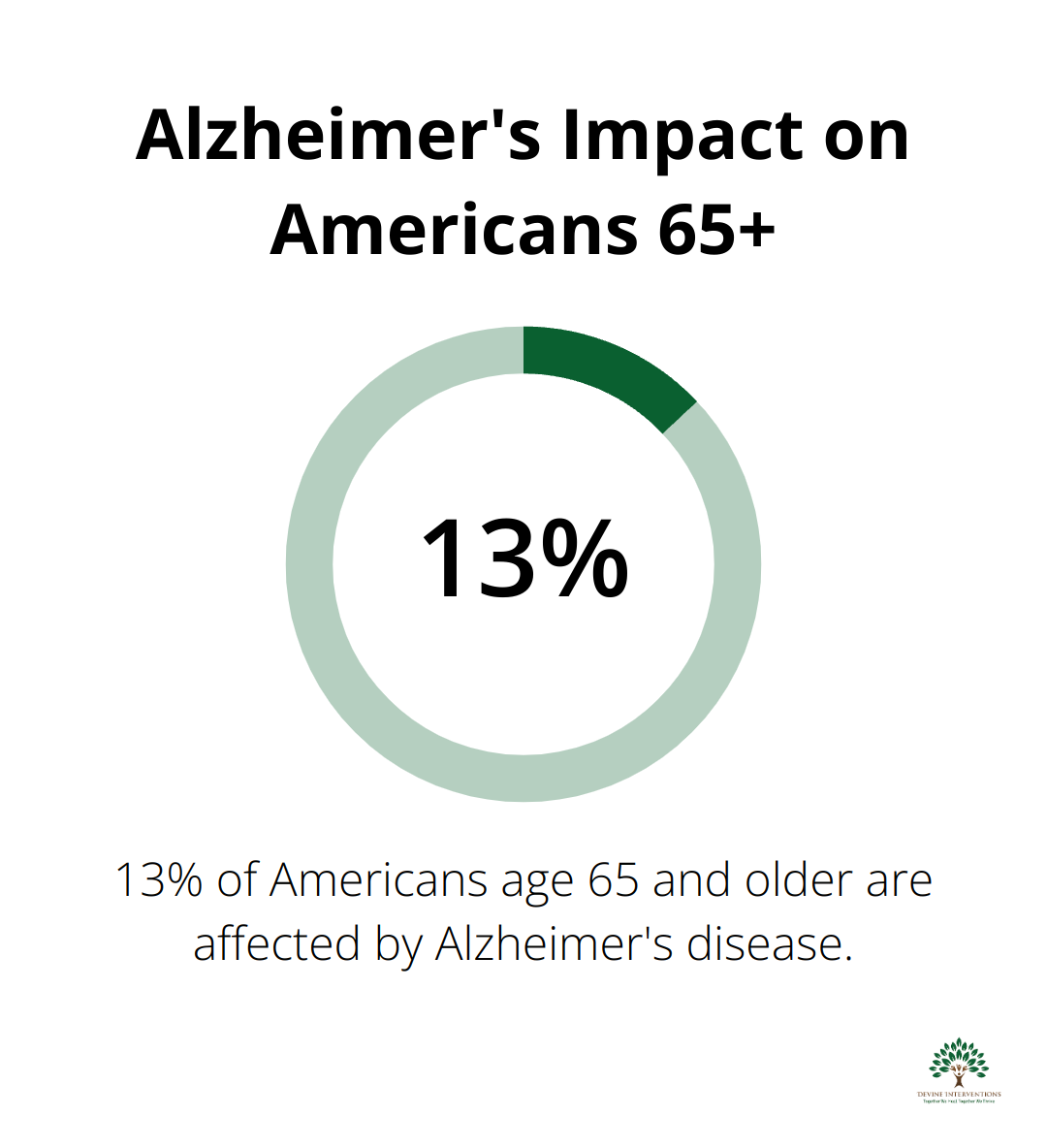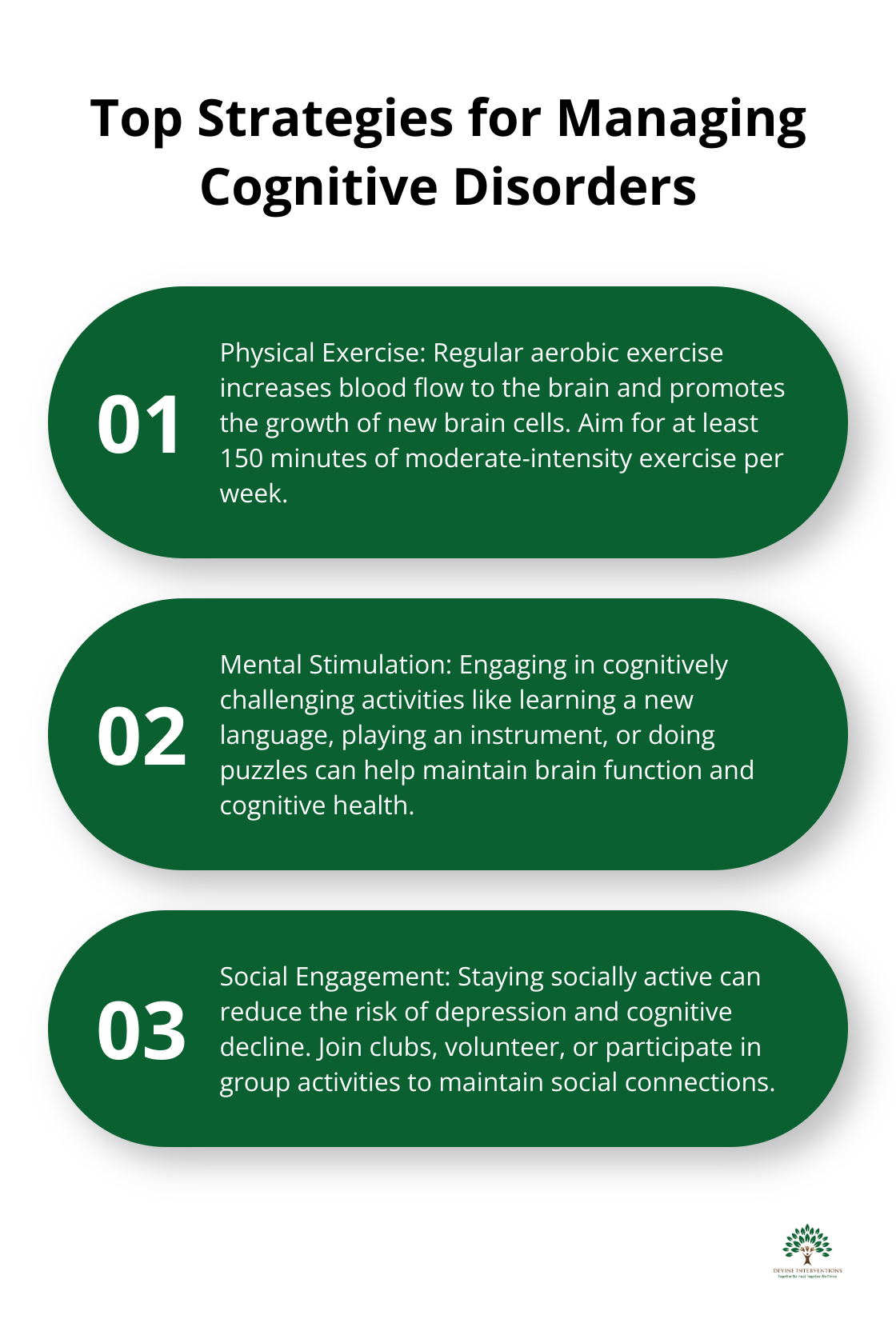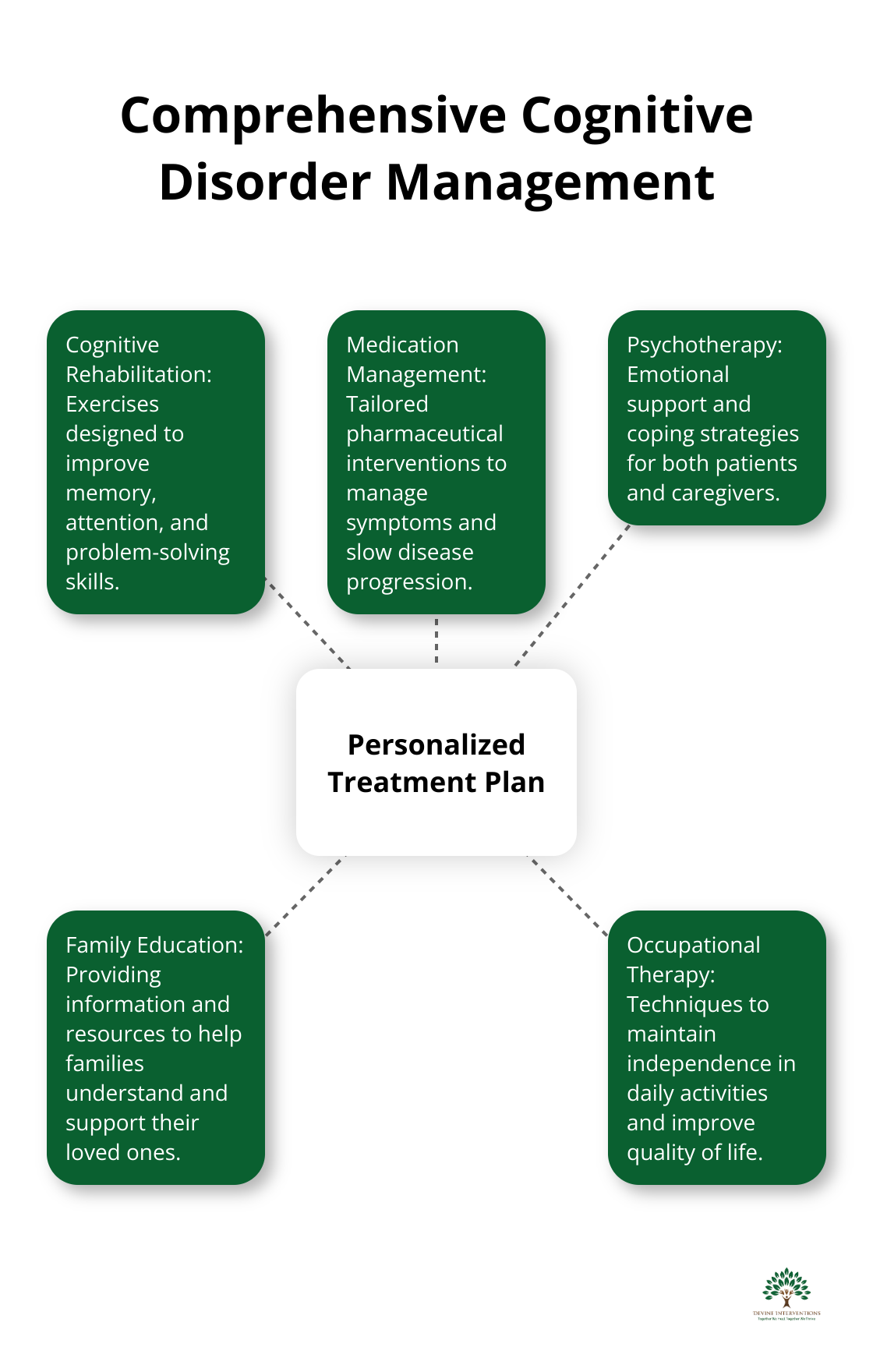Cognitive disorders can profoundly impact daily life, affecting memory, thinking, and behavior. These conditions often leave individuals and their loved ones feeling overwhelmed and uncertain about the future.
At Devine Interventions, we understand the challenges that come with managing cognitive disorders. Our team of specialists is committed to providing compassionate care and effective strategies to help you navigate this journey.
What Are Cognitive Disorders?
Types of Cognitive Impairments
Cognitive disorders affect mental processes like memory, thinking, and decision-making. At Devine Interventions, we see patients with various cognitive impairments.
Alzheimer’s disease tops the list, affecting an estimated 7.2 million Americans age 65 and older today. It causes progressive memory loss and confusion. Vascular dementia, often stroke-related, ranks second. We also treat patients with Lewy body dementia, which can cause visual hallucinations and movement problems.

Mild Cognitive Impairment (MCI) is another common condition. It sits between normal aging and dementia, with noticeable memory or thinking problems that don’t significantly impact daily life.
Warning Signs to Watch
Early detection plays a key role in effective management. We advise patients and families to look out for these signs:
- Frequent memory lapses (especially forgetting new information)
- Difficulty with planning or problem-solving
- Trouble completing familiar tasks
- Confusion about time or place
- Visual perception problems
- New speaking or writing difficulties
- Misplacing items and inability to retrace steps
- Poor judgment
- Withdrawal from work or social activities
- Mood or behavior changes
If you notice several of these symptoms, it’s time to seek professional help. Devine Interventions offers comprehensive assessments to identify cognitive issues early.
Daily Life and Relationship Impact
Cognitive disorders can disrupt daily routines and strain relationships. Our patients often report difficulties with:
- Managing finances
- Keeping up with household chores
- Maintaining jobs
- Social interactions (leading to isolation and depression)
Relationships often change dramatically. Spouses may become caregivers, while adult children struggle to adapt to their parent’s new needs. These shifts can cause stress, frustration, and sometimes resentment.
At Devine Interventions, we understand these challenges. Our approach includes treating the individual and supporting their family members. We offer family therapy sessions and connect caregivers with support groups and resources.
The Importance of Professional Care
Cognitive disorders are medical conditions, not a normal part of aging. With proper diagnosis and management, many people maintain their quality of life longer. If you’re concerned about cognitive changes in yourself or a loved one, reach out to Devine Interventions. Our team stands ready to provide the support and care you need.
Next, we’ll explore effective strategies to manage cognitive disorders, including both medical and lifestyle approaches. These strategies can make a significant difference in maintaining independence and quality of life for those affected by cognitive impairments.
How to Manage Cognitive Disorders Effectively
At Devine Interventions, we’ve seen how early intervention and a comprehensive approach improve outcomes for those with cognitive disorders. Let’s explore practical strategies that make a real difference in managing these conditions.
The Importance of Early Detection
Identifying cognitive changes early is vital. Research shows that interventions started in the early stages of cognitive decline can slow progression and maintain independence longer. We recommend cognitive screenings for adults over 65, or earlier if there’s a family history of dementia.
Don’t wait for major memory lapses. Even subtle changes in thinking or behavior warrant a professional assessment. Advanced screening tools can detect cognitive changes before they significantly impact daily life.
Medication: One Part of the Solution
While there’s no cure for most cognitive disorders, certain medications can help manage symptoms and slow progression. For Alzheimer’s disease, drugs like donepezil, rivastigmine, and galantamine can temporarily improve memory and thinking skills.
For vascular dementia, managing underlying conditions is key. Blood pressure medications, anticoagulants, and cholesterol-lowering drugs can help prevent further damage.
It’s important to note that medication effectiveness varies. Finding the right combination and dosage, and adjusting as needed, maximizes benefits while minimizing side effects.
Lifestyle Changes as Medicine
Medication alone isn’t enough. Lifestyle changes play a crucial role in managing cognitive disorders. Here are some evidence-based strategies:

- Physical Exercise: Regular aerobic exercise increases blood flow to the brain and promotes the growth of new brain cells. Try at least 150 minutes of moderate-intensity exercise per week.
- Mental Stimulation: Engaging in cognitively challenging activities (like learning a new language, playing an instrument, or doing puzzles) can help maintain brain function.
- Social Engagement: Staying socially active can reduce the risk of depression and cognitive decline. Join clubs, volunteer, or participate in group activities.
- Nutrition: A Mediterranean-style diet rich in fruits, vegetables, whole grains, and lean proteins has been linked to better cognitive health.
- Sleep Hygiene: Poor sleep can exacerbate cognitive issues. Establish healthy sleep routines (sometimes using cognitive behavioral therapy for insomnia when needed).
Holistic Approach to Care
A comprehensive management plan combines medical treatment with lifestyle modifications, therapy, and family support. This approach doesn’t just treat symptoms; it addresses the whole person.
Managing a cognitive disorder requires ongoing adjustments and support. Professional guidance ensures you have the tools and support you need to live your best life possible.
As we move forward, let’s explore the critical role that specialized mental health professionals play in treating cognitive disorders. Their expertise and personalized care can make a significant difference in your journey towards better cognitive health.
Why Professional Care Matters for Cognitive Disorders
Professional care plays a vital role in managing cognitive disorders effectively. At Devine Interventions, we’ve witnessed how specialized mental health professionals can significantly improve outcomes and quality of life for those affected.
The Power of Expertise
Mental health professionals who specialize in cognitive disorders offer invaluable knowledge and experience. They keep up with the latest research and treatment options, ensuring patients receive the most effective care possible.
These experts can detect subtle changes that general practitioners might miss. Early intervention can dramatically impact the course of cognitive disorders. Early detection of cognitive disorders is critical since it enables earlier initiation of treatment and reduction of disease progression at stages with minimal cognitive loss.
Personalized Treatment Plans
We don’t believe in one-size-fits-all solutions at Devine Interventions. Our approach involves creating tailored treatment plans that address each individual’s specific needs, symptoms, and life circumstances. These plans might include:

- Cognitive rehabilitation exercises
- Medication management
- Psychotherapy for emotional support
- Family education and support
- Occupational therapy to maintain independence
We reassess and adjust these plans regularly, ensuring that the treatment evolves with the patient’s changing needs.
Ongoing Support and Monitoring
Cognitive disorders often progress, requiring continuous care and support. Professional care provides a consistent touchpoint for monitoring changes, adjusting treatments, and addressing new challenges as they arise.
Regular check-ins and assessments help catch any issues early and allow for prompt interventions. This continuous care also provides peace of mind for patients and their families, knowing they have a dedicated team supporting them throughout their journey.
The Impact on Quality of Life
Professional care for cognitive disorders extends beyond symptom management. It aims to improve overall quality of life. With the right support, many individuals with cognitive disorders can maintain their independence longer and enjoy a higher quality of life.
For example, occupational therapists can help patients develop strategies to continue performing daily tasks (like cooking or managing finances) independently. Psychologists can provide emotional support and coping strategies for both patients and caregivers. These interventions can significantly enhance well-being and reduce caregiver stress.
The Role of Specialized Facilities
Specialized facilities (like memory care units) can provide a safe and stimulating environment for individuals with advanced cognitive disorders. These facilities offer:
- 24/7 specialized care
- Activities designed to maintain cognitive function
- Safe, navigable spaces to reduce confusion and accidents
- Social opportunities to combat isolation
While not everyone with a cognitive disorder needs this level of care, knowing these options exist can provide comfort to families planning for the future.
Final Thoughts
Cognitive disorders require a comprehensive approach that combines professional care and lifestyle changes. Early detection and specialized treatment plans can slow progression and maintain quality of life for individuals affected by these conditions. Medication and lifestyle modifications, such as exercise and mental stimulation, play key roles in managing cognitive health.
Professional care from mental health experts provides invaluable support in navigating cognitive disorders. These specialists offer personalized treatment plans, ongoing monitoring, and access to the latest interventions. Their expertise ensures individuals receive comprehensive care tailored to their unique needs and circumstances.
Devine Interventions supports individuals through every stage of cognitive disorders. We provide a range of services (including assessments, therapy, and medication management) to address all aspects of cognitive health. If you or a loved one experience cognitive changes, contact us for compassionate, evidence-based care to maintain your cognitive well-being.







